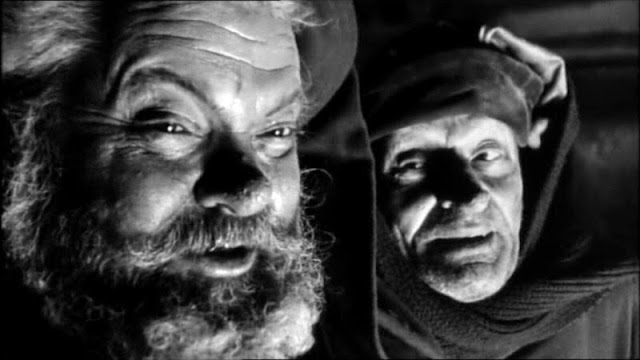Chimes at Midnight
New York Times film critic Bosley Crowther was not among those offering accolades to Orson Welles for his performance in 1965's CHIMES AT MIDNIGHT. For the actor's interpretation of Shakespeare's Jack Falstaff, Crowther dismissed it as "a dissolute, bumbling street-corner Santa Claus." I find that very funny, as Welles does in fact look like a St. Nick gone to seed, carousing with other merry men at the local watering hole. The actor/director/writer was always a formidable presence onscreen, in all that such a statement would entail. His resemblance to Santa Claus is quickly forgotten though, as Welles entirely disappears into an ultimately highly tragic figure, putting forth the Bard's words with a rich basso and ambling with an inebriated gait so befitting.
Among Falstaff's charges is Prince Hal, son of recently crowned King Henry IV (John Gielgud). Hal willingly engages in a lifestyle of drink and thievery perhaps as a raspberry to his father, who achieved his position through the murder of Richard II. Yet Hal maintains that he will one day assume his place among the nobility, a rightful heir. Falstaff and company hear but do not listen. There is the angry son of Richard, along with cousins who plot Henry's overthrow. There is a battle, one in which Falstaff (sort of) participates. An ill king. A final kiss off.
CHIMES AT MIDNIGHT is a patchwork of text from several of Shakespeare's tragedies, including Henry IV (Parts I and II). John Falstaff was a recurring character in his works and here acts as a paternal figure to Hal, albeit a rather "dissolute" one. Hal's divided loyalties to Henry and Falstaff forms the main conflict of the picture, until that climactic speech, as crushing as ever:
I know thee not, old man: fall to thy prayers;
How ill white hairs become a fool and jester!
I have long dream'd of such a kind of man,
So surfeit-swell'd, so old and so profane;
But, being awaked, I do despise my dream.
Film buffs may recall another adaptation of this famous siloloquy in 1993's MY OWN PRIVATE IDAHO. The material is timeless and quite adaptable. Welles creates a plentiful, lyrical stew for the faithful, himself remaining devout to the sacred text. Those words are indeed musical, and reading/hearing them is always heady and intoxicating. Easy to get lost in them.
Criterion has presented another impressive remaster, even with the occasional mis-synched bit of dialogue. CHIMES AT MIDNIGHT's low budget was a hindrance for some but for me does not detract from the lonely, patently theatrical and cinematic atmosphere. Gielgud's familiar voice works interestingly, as does his performance. He feels as if emodying a different space than the other actors, as if still in an actual stage play. It works in some odd way. The limited budget also did not prevent a ten minute battle scene that may not be as well choreographed as other adaptations but does manage to capture the appropriate chaos.
I have to agree when critics say that Welles had perhaps his greatest role as Falstaff. So carnal and mischievous, so tragic.



Comments